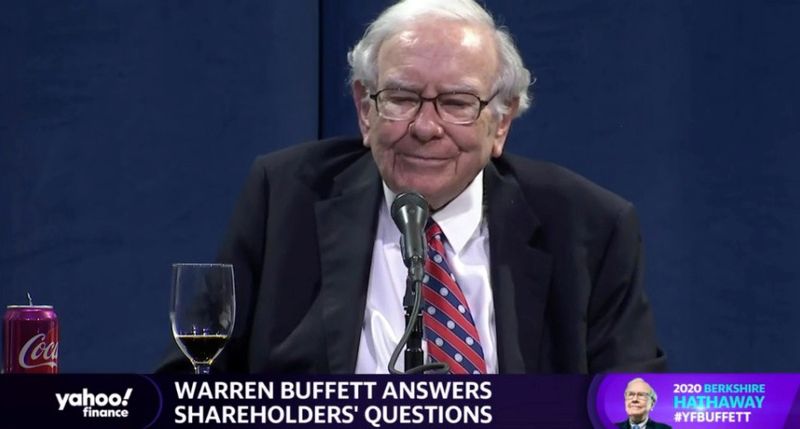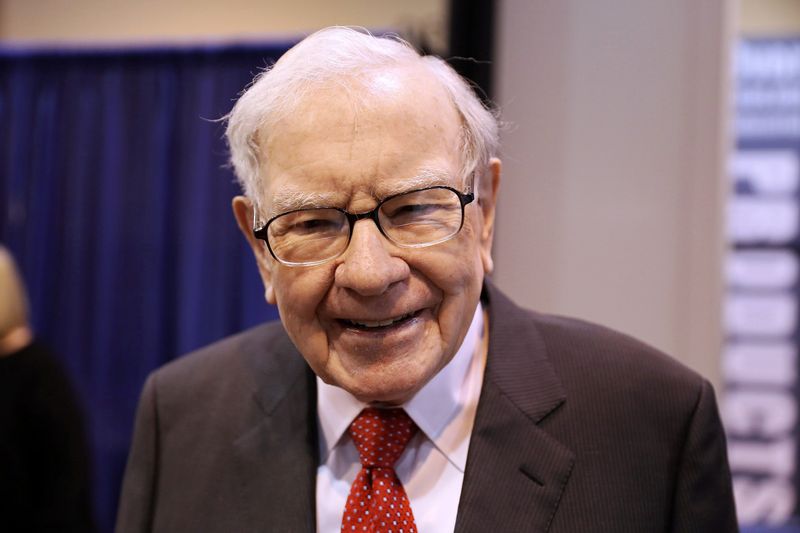(This May 2 story has been refiled to correct the spelling of "towel" in second paragraph)
By Jonathan Stempel and Megan Davies
(Reuters) - Billionaire investor Warren Buffett on Saturday said the United States' capacity to withstand crises provides a silver lining as it combats the coronavirus, even as he acknowledged that the global pandemic could significantly damage the economy and his investments.
Over more than 4-1/2 hours at the annual meeting of Berkshire Hathaway Inc (N:BRKa), Buffett said his conglomerate has taken many steps responding to the pandemic, including providing cash to struggling operating units, and throwing in the towel on a multi-billion-dollar bet on U.S. airlines.
Buffett also said he remains keen on making a big acquisition, which he has not done since 2016, but has not provided financial support to companies as he did during the 2008 financial crisis because he saw nothing attractive enough, even after the recent bear market.
The 89-year-old opened the meeting in Omaha, Nebraska with 1-3/4 hours of remarks to soothe anxious investors, urging them to stay committed to stocks despite this year's bear market, even if the pandemic gets a second wind late this year.
Illustrating his remarks with dozens of plain black-and-white slides, Buffett called dealing with the pandemic "quite an experiment" that had an "extraordinarily wide" range of possible economic outcomes.
But he said Americans have persevered and prospered through such crises as the Civil War in the 1860s, the influenza pandemic a century ago and the Great Depression. American "magic" prevailed before and would do again, he said.
"Nothing can stop America when you get right down to it," Buffett said. "I will bet on America the rest of my life."
The meeting was held virtually for the first time because of the pandemic, without shareholders in attendance, and streamed by Yahoo (NASDAQ:AABA) Finance.
Buffett and Vice Chairman Greg Abel, 57, spent nearly 2-1/2 hours answering shareholder questions posed by a reporter.
Abel has day-to-day oversight of Berkshire's non-insurance businesses, and is considered by many analysts and investors a top candidate to eventually succeed Buffett as chief executive.
BERKSHIRE EXITS AIRLINES
The meeting began several hours after Berkshire reported a record $49.75 billion first-quarter net loss, reflecting huge unrealized losses on common stock holdings such as Bank of America Corp (N:BAC) and Apple Inc (O:AAPL) during the market meltdown.
While quarterly operating profit rose 6%, several larger businesses including the BNSF railroad posted declines, hurt by the negative impact of COVID-19, the illness caused by the novel coronavirus.
Buffett said operating earnings will, through at least this year, be "considerably less" than they would have been had the pandemic not occurred.
Berkshire's cash stake ended the quarter at a record $137.3 billion, though Buffett said "we're willing to do something very big," perhaps a $30 billion to $50 billion transaction.
But it won't be in U.S. airlines, after Buffett confirmed that Berkshire in April sold its "entire positions" in the four largest: American Airlines Group Inc (O:AAL), Delta Air Lines Inc (N:DAL), Southwest Airlines Co (N:LUV) and United Airlines Holdings Inc (O:UAL).
Buffett said he "made a mistake" investing in the sector, which the pandemic has changed "in a very major way" with no fault of the airlines, leaving limited upside for investors.
"It is basically that we shut off air travel in this country," he said.
The meeting was devoid of the surrounding three-day weekend of dining, shopping and other celebratory events that annually draw tens of thousands of people to Omaha for what Buffett calls "Woodstock for Capitalists."
ABEL SHARES THE STAGE
Abel stood in for longtime Vice Chairman Charlie Munger, 96, who normally joins Buffett to answer shareholder questions.
Buffett said Munger was in "fine shape" and "good health," and looked forward to attending Berkshire's 2021 annual meeting.
Vice Chairman Ajit Jain, 68, who oversees Berkshire's insurance businesses and is also considered a possible CEO candidate, was also absent from the meeting. Abel lives closer to Omaha than Munger and Jain.
Berkshire has said its board of directors knows who would become CEO if Buffett died or became incapacitated.
Buffett's eldest son Howard would likely become non-executive chairman, and portfolio managers Todd Combs and Ted Weschler could succeed Buffett as chief investment officer.
Abel told investors "I don't see the culture of Berkshire changing" after Buffett and Munger are no longer there.
He also said Berkshire was likely to expand its workforce, which totaled 391,539 people at year end, even though some businesses have furloughed employees and cut salaries since the pandemic began, and could start resorting to layoffs.
Berkshire wouldn't be alone. Nationwide jobless claims have since March 21 totaled about 30.3 million, or 18% of the workforce, a level not seen since the Great Depression.
Abel nonetheless said that in five years, "we see our employment numbers being far greater than they are today."

Shareholders also elected Kenneth Chenault, a former chief executive of longtime Berkshire holding American Express Co (N:AXP), to Berkshire's board, making him the company's first African American director.
